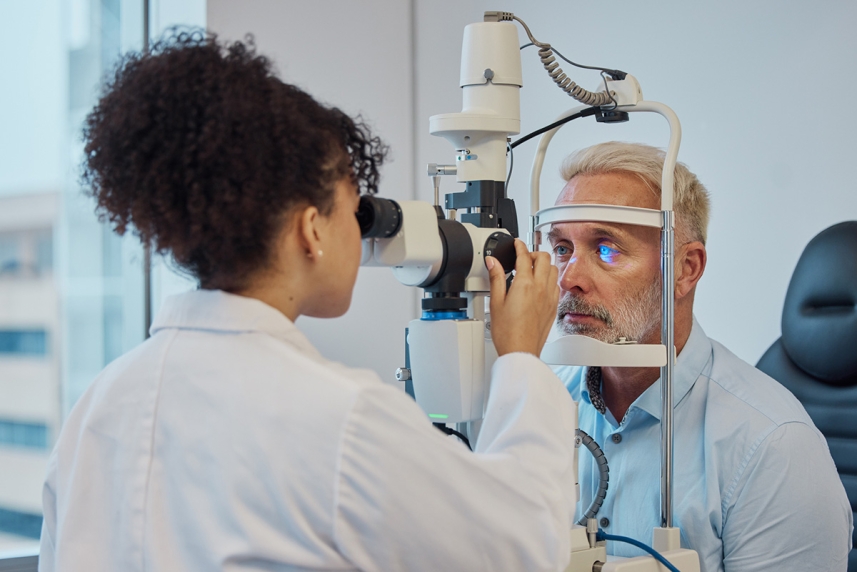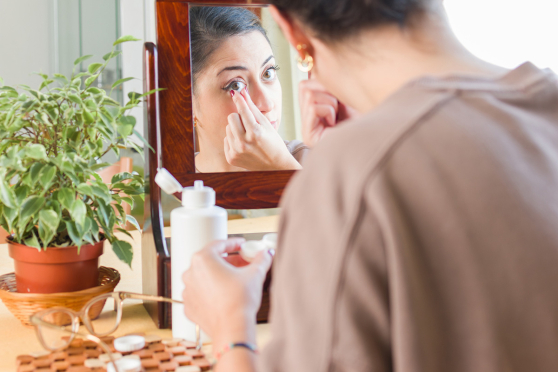A super easy way to help lower the risk of dementia
Getting regular eye exams may help keep a person’s sight and brain sharp as they age.

A yearly appointment with an eye care provider may be as important as any other annual checkup. For one thing, it’s an important part of making sure a person’s eyesight stays sharp — or gets corrected, if needed. It’s also an excellent way to check for any age-related eye diseases, such as glaucoma and macular degeneration.
What people may not realize, though, is that what’s good for the eyes may also be good for the brain. Besides making sure vision problems are under control, seeing an eye care provider regularly may help lower the chance of developing dementia. That’s a general term for a loss of memory, language, problem-solving and other thinking abilities that may get in the way of a person’s normal life.
Learn how issues with vision may affect the brain — and why staying on top of your annual eye exams may be a good idea at any age.
Stay on top of your eye health with an in-network provider. Search for an eye care provider now.
How might the eyes and brain work together?
Think of the eye as a fancy camera, explains Brad Sutton, O.D., F.A.A.O. He’s a clinical professor at the Indiana University School of Optometry in Bloomington, Indiana. The retina is the light-sensitive layer at the back of the eye. Its nerve fibers combine to form the optic nerve, which is connected to the brain.
When light hits the retina, cells turn it into electrical signals that travel through the optic nerve. “The brain then turns those signals into the images the eye is actually seeing,” says Dr. Sutton, who is also the chief of service at the Indianapolis Eye Care Center.
This area of the brain turns out to be quite large, says Mohammad Fouladvand, M.D. He’s a neuro-ophthalmologist in private practice in New York City. He’s also an attending physician at Northwell Health’s Lenox Hill Hospital in New York City. (A neuro-ophthalmologist is a type of eye doctor that specializes in diseases affecting the eye and its connection to the brain and central nervous system.)
More than 40% of what makes up the brain is devoted to vision and interpreting what’s being seen, says Dr. Fouladvand. “That includes eye movement and visual perception, such as forms, shapes, motion perception and visual memory,” he says. That’s why an early symptom of many diseases or disorders of the brain or central nervous system, which includes the brain and spinal cord, may be vision troubles, he adds.
Some of these include:
- Alzheimer’s disease (a type of dementia that affects memory, thinking and behavior)
- Memory loss
- Parkinson’s disease (a disorder of the central nervous system that affects movement)
What might the links be between vision loss and poor thinking skills?
A person has 5 senses: sight, hearing, smell, taste and touch. But when one of those is damaged, it may have a negative result on a person’s thinking. For instance, there may be a link between hearing loss and the development of dementia in older adults, according to the National Institute on Aging (NIA).1
There may also be evidence suggesting that vision problems may have a similar result. In a study in the American Journal of Ophthalmology, dementia was more than twice as common in older adults who couldn’t see well, compared with older adults who could.2
There may be various theories about why poor eyesight may lead to memory loss. These might include:
- Vision and hearing loss may change the structure of the brain in a way that affects thinking.3
- “When you have poor or low vision, your brain has to spend more time and energy to recognize what you can’t see,” says Dr. Fouladvand. In other words, it has to work harder. When that happens, the brain has more trouble with things like recognition, focusing and memory, he explains.
Poor or low vision may also lead to a person not being as social in their community or with friends and family, which may affect their mental health. “This can cause depression and anxiety,” says Dr. Fouladvand. This may put a person at risk of developing brain-related disorders, such as cognitive impairment and dementia.
How might an eye care provider help protect vision and brain health?
The American Optometric Association recommends that everyone over the age of 60 get an annual eye exam to stay on top of their health.4 During an eye exam, an eye care provider might test:
- Color vision (the ability to see different colors)
- Depth perception (the ability to see objects in 3 dimensions, including their size and how far away they are from you)
- Visual acuity (ability of the eye to see shapes and the details of objects at a given distance)
These are all related to how the brain works, and whether it may be healthy.
An eye care provider may perform a dilated eye exam to pinpoint problems or damage to the optic nerve and retina. They may then be able to diagnose eye conditions such as diabetic retinopathy, glaucoma and macular degeneration.
All 3 are serious conditions that may gradually cause poor vision, but cataracts may also lower a person’s eyesight, making it hard to drive or even get around the house. And the same may be true for someone who needs new glasses. (Need a new pair? Access vision benefits today.)
The sooner an eye care provider diagnoses an issue, the sooner it may be treated. Even simple solutions such as getting an updated eyeglasses prescription or cataract surgery may lower the odds of cognitive decline.
In fact, up to 100,000 cases of dementia in the United States may be prevented with improved eye care, according to the NIA.1
“Going to an eye doctor helps keep tabs on any ocular issues, especially the development of certain age-related eye diseases,” says Dr. Sutton. Catching these eye-related problems early may help improve and preserve vision. This, in turn, may help to maintain brain function, he adds.
Providers in the UnitedHealthcare Vision Network are here to help keep your vision healthy. Search for an eye care provider now.
Sources:
- Take care of your senses: The science behind sensory loss and dementia risk. National Institute on Aging, January 2023.
- Using objective vision measures to explore the association of vision impairment with cognition among older adults in the United States American Journal of Ophthalmology, June 2023.
- New insights into sensory impairment and dementia risk JAMA Network Open, May 2022.
- Senior vision: over 60 years of age American Optometric Association.


